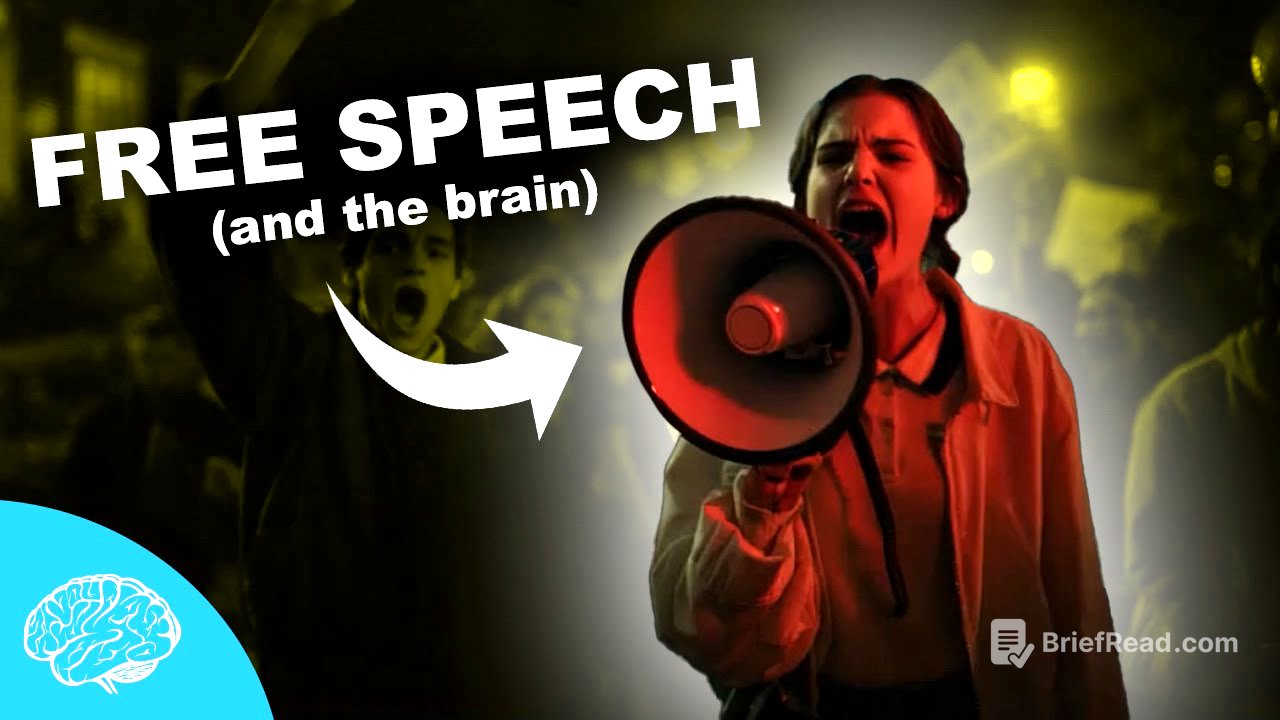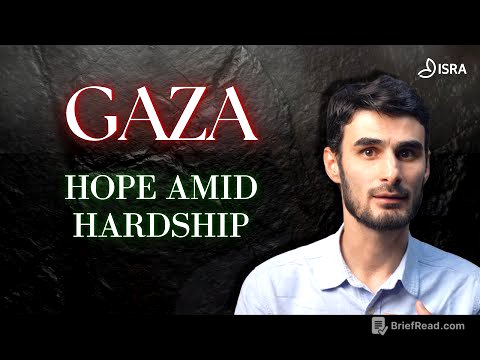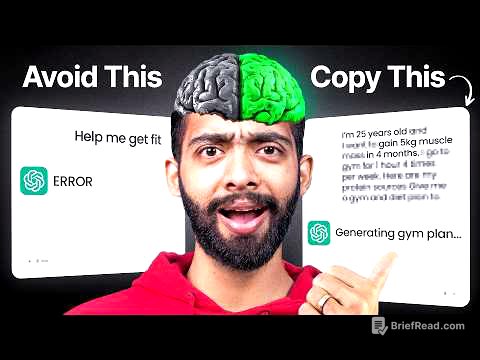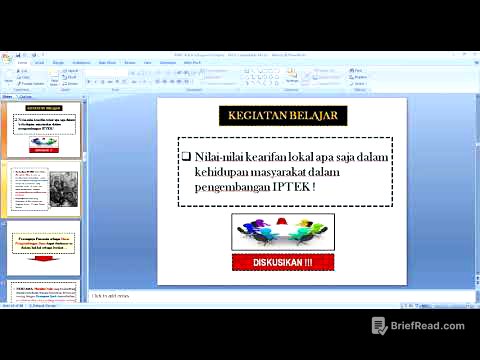TLDR;
David Eagleman discusses the importance of free speech from a neuroscience perspective, arguing that exposure to diverse ideas expands our internal models of the world and promotes cognitive flexibility. He interviews Greg Lukianoff, a constitutional lawyer and free speech advocate, who shares insights on how free speech makes us safer, protects the powerless, and fosters intellectual development. They explore the limits of free speech, the dangers of equating words with violence, and the role of epistemic humility in navigating complex issues.
- Free speech is essential for expanding our limited internal models of the world.
- Exposure to diverse opinions promotes cognitive flexibility and intellectual development.
- Free speech protects the powerless and serves as an alternative to violence.
- Epistemic humility, the recognition of the limits of our knowledge, is crucial for fostering a culture of free speech.
Introduction: The Neuroscience of Free Speech [0:00]
David Eagleman introduces the concept of free speech from a neuroscientific perspective, asserting its importance in expanding our understanding of the world. He argues that our brains operate by building internal models of reality, which are inherently limited by our personal experiences and cultural context. Free speech is presented as a means of illuminating ideas outside our immediate awareness, challenging our assumptions, and refining our internal models.
The Importance of Hearing Diverse Ideas [2:45]
Eagleman emphasizes that the value of free speech lies not only in the ability to express oneself but also in the critical importance of hearing diverse perspectives. He contends that exposure to new ideas, even uncomfortable ones, expands our mental boundaries and allows us to see territory we didn't know existed. This friction polishes us, enabling us to gain wisdom and avoid the pitfalls of personalization algorithms and social silos that limit our exposure to different worldviews.
The Discomfort of Free Speech and the Rise of Emotional Reasoning [5:39]
Eagleman acknowledges that free speech can trigger discomfort, as it requires us to entertain opposing ideas and confront our own imperfections. He notes a shift in recent years, particularly on campuses and social platforms, towards emotional reasoning, where disagreement is equated with offense and speech is suppressed. He introduces Greg Lukianoff, a constitutional lawyer and free speech advocate, to discuss these issues further.
Greg Lukianoff's Journey to Free Speech Advocacy [8:36]
Greg Lukianoff shares his background and how his family's experience fleeing the Soviets and growing up in a diverse community instilled in him a deep appreciation for free speech. He discusses his legal studies, focusing on First Amendment rights, and his early work fighting censorship, particularly in the context of the internet and the Communications Decency Act.
Limits to Free Speech and Opinion Absolutism [11:28]
Lukianoff clarifies that while he is an opinion absolutist, believing in the value of knowing people's opinions, he is not a free speech absolutist. He outlines the limits to free speech in America, including incitement to imminent lawless action, defamation, obscenity, and child pornography. He emphasizes that unprotected speech often involves elements that resemble parts of crimes, such as harassment.
Free Speech Makes You Safer: Group Polarization and Censorship [14:07]
Lukianoff argues that free speech makes us safer by providing more knowledge about what people truly think. He explains that censorship can lead to group polarization, where like-minded individuals become more radicalized in their views when they only interact with each other. He uses the example of anti-Semitism in Europe, where laws against anti-Semitic speech may have inadvertently created echo chambers for anti-Semites.
Free Speech Makes You Smarter: Mill's Trident and Epistemic Humility [16:17]
Lukianoff asserts that free speech makes us smarter by exposing us to diverse viewpoints and challenging our internal models of the world. He introduces "Mill's Trident," based on John Stuart Mill's arguments in "On Liberty," which posits that free speech is essential whether you are wrong, partially right, or entirely right. He emphasizes the importance of epistemic humility, recognizing the limits of our knowledge, in fostering intellectual growth.
Free Speech Protects You from Violence: Cultures of Honor vs. Cultures of Dignity [18:31]
Lukianoff argues that free speech serves as an alternative to violence. He contrasts cultures of honor, where individuals are responsible for protecting their property, family, and reputation through violence if necessary, with cultures of dignity, where legitimate authority and the rule of law prevail. He criticizes the notion that offensive speech constitutes violence, as this can lead to a dangerous spiral of violence.
The Totalitarian Temptation and the Advantages of Free Societies [23:42]
Lukianoff discusses the "totalitarian temptation," the desire for everyone to agree with one's own opinions and for the government to enforce those opinions. He argues that free societies, despite their imperfections, are better by virtually every measure, including wealth, innovation, and happiness. He cites historical examples, such as the performance of liberal societies in World War I and the fall of the Soviet Union, to support his argument.
The Moral Argument for Free Speech and Natural Rights [28:50]
Lukianoff presents the moral argument for free speech, asserting that every individual with a mind or soul should have certain inherent rights, including the right to express their thoughts without fear of arbitrary deprivation. He connects this idea to natural rights and human rights, arguing that a just society recognizes and protects these fundamental entitlements.
Free Speech Defends the Powerless: Minority Rights and Campus Monocultures [29:55]
Lukianoff contends that free speech defends the powerless, as it provides essential protections for those who are unpopular with power or the majority. He cites historical figures like Frederick Douglass, Gandhi, and Nelson Mandela as champions of free speech because they understood its importance for minority rights. He criticizes the monoculture on many college campuses, where a lack of viewpoint diversity can lead to the suppression of dissenting opinions.
The Shift on College Campuses: From Administrator Overreach to Student Activism [32:16]
Lukianoff describes a shift he has observed on college campuses over the years. Initially, he primarily dealt with administrators over enforcing speech codes. However, around 2013-2014, he began to notice a growing number of students who genuinely believed that certain speech was psychologically harmful and should be suppressed.
The Coddling of the American Mind: Cognitive Distortions and Social Media [34:57]
Lukianoff discusses the factors that contributed to the worsening of free speech issues on college campuses, including the rise of social media and the increasing political homogeneity of campus environments. He explains how students who grew up with smartphones developed a moralistic and often nasty style of argumentation, using social media to cancel those with whom they disagreed.
Intersectionality, Good vs. Evil Mentalities, and the Importance of Free Speech Culture [38:13]
Lukianoff explores the role of ideological assumptions, such as a black-and-white morality and the oversimplification of complex realities, in creating an environment that is not conducive to knowledge creation and open debate. He emphasizes the importance of cultivating a free speech culture, where individuals are expected to listen to and respect diverse viewpoints, even those they find offensive.
Epistemic Humility and the Illusion of Explanatory Depth [42:36]
Lukianoff underscores the importance of epistemic humility, the recognition of the limits of our knowledge, in fostering a culture of free speech. He connects this idea to the illusion of explanatory depth, the tendency to overestimate how much we actually know and understand. He argues that challenging our beliefs and exposing ourselves to diverse perspectives is essential for intellectual growth.
Even Bad People Can Have Good Ideas: Cognitive Discomfort and Intellectual Development [48:14]
Lukianoff argues that even bad people can have good ideas, and that we should not dismiss ideas simply because we dislike the person who espouses them. He emphasizes the importance of cognitive discomfort in intellectual development and expresses concern that increasing comfort and affluence may lead to a decline in appreciation for free speech.
The Future of Free Speech and the Role of AI [50:47]
Lukianoff expresses concern about the future of free speech, particularly in the context of artificial intelligence. He predicts a "balkanization of AI," where different groups train AI models on their own literature, resulting in AIs that only present a particular point of view. He discusses a project his organization is undertaking to develop epistemically humble AI that promotes freedom of speech and critical thinking.
Conclusion: Wiring a Better Brain Through Free Speech [54:55]
David Eagleman concludes by reiterating the importance of free speech in expanding our internal models, processing disagreement, and building psychological anti-fragility. He encourages listeners to seek out conversations and books that challenge their views, as every argument addressed with genuine attention is an opportunity to wire a better brain.









